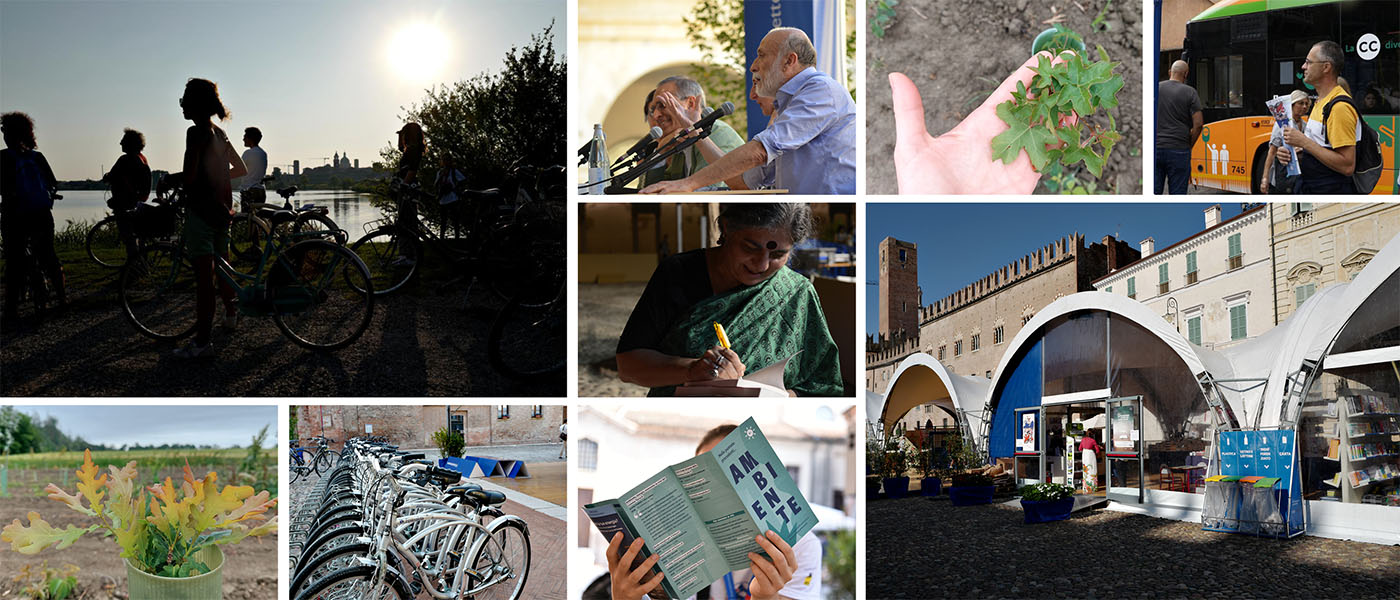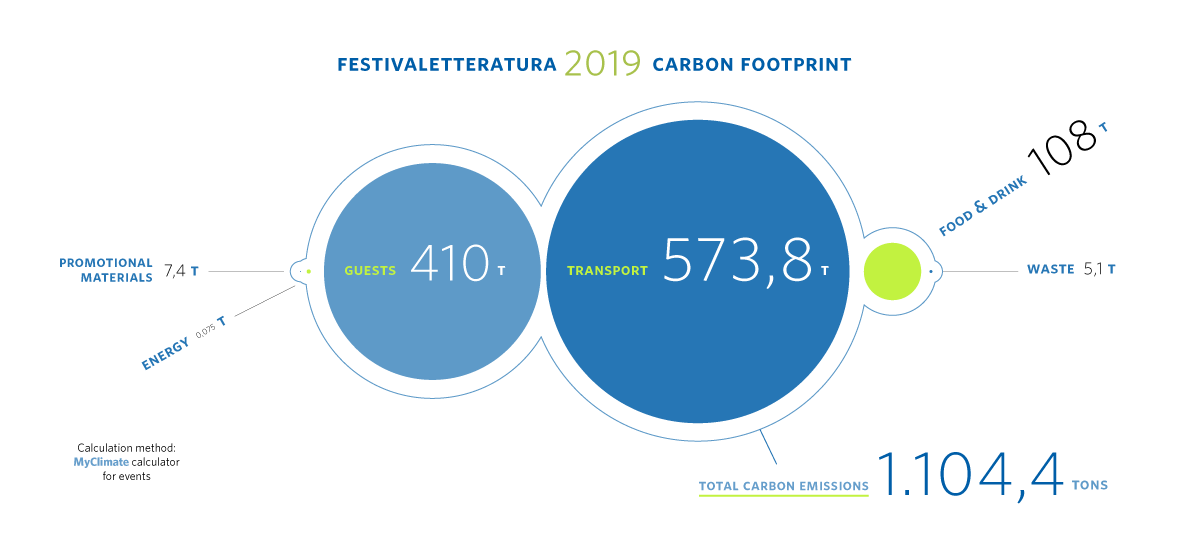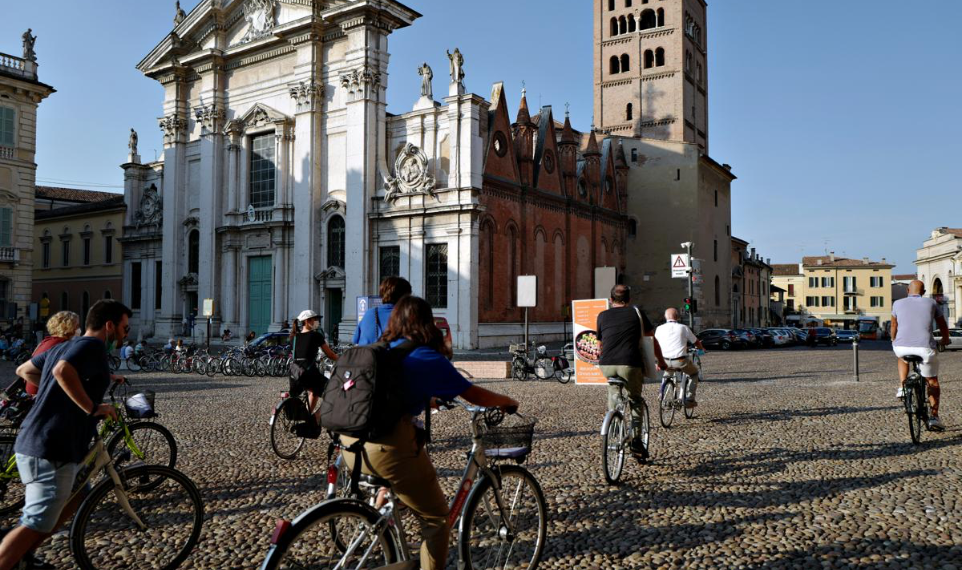
Festivaletteratura has long been committed to raising public awareness regarding the understanding and protection of the environment.
2011 saw the launch of the Consapevolezza Verde (Green Awareness) project, a more structured inclusion of the themes and key figures surrounding the debate on environmental issues in each year’s programme. Since then, the events have inspired concrete actions to reduce the Festival's carbon footprint and the development
of an agenda that balances organisational needs and
environmental sustainability. In 2019, following an invitation from Mantua City Council, Festivaletteratura joined the Local Urban Group of the European project C-change, which aims to transfer best practice developed by the Manchester Arts Sustainability Team (MAST) to local groups in project partner cities. The aim is to rally the cultural sector around the issues related to the climate crisis, to achieve a steady reduction in the sector's carbon footprint and greater awareness of environmental issues among the general public.
Thanks to our involvement in the C-change project and the advice of the Environment Department of Mantua City Council, we were able to calculate our carbon footprint in 2020, using data from Festivaletteratura 2019 as a reference.

This new awareness of our event's impact has given us a boost in resuming all the good practice already in place since 2011 and in adding new and more challenging measures. If you would like to learn more about our environmental policy plan, please have a look at the policy document and learn about all the measures we are taking.
 Consapevolezza verde
Consapevolezza verde

Consapevolezza verde (Green Awareness) is the banner under which, since 2011, all events included in the Festivaletteratura programme related to the themes of ecology, climate, the fight against resource waste and sustainable economy have been grouped. The project was created when the Festival was awarded the "Spreco Zero” (Zero Waste) label by Last Minute Market, a spin-off from the University of Bologna engaged in the development of waste reduction projects.
Over the years, dozens of talks, lectures, interviews and workshops have been held
(Monique Barbut, Gianfranco Bologna, Salvatore Ceccarelli, Jonathan
Safran Foer, Kate Raworth, Vandana Shiva, Pavan Sukhdev, Peter
Wadhams are just some of the numerous scientists, politicians, activists, storytellers and science journalists at the Festival) hanno portato
and they have brought the importance of the environment and its conservation to the attention of the public, contributing to the development of a collective ecological awareness. At the end of each edition, the debate continues to leave its mark thanks to the recordings kept in the Festivaletteratura Archives.

In terms of environmental sustainability, the above data of the infographic show that transport is the most significant aspect of the Festival, both from a strictly environmental point of view and in terms of its impact on the city, and on the city centre.
For these reasons, the main objective that the event set itself for the 2021 edition in terms of transport is to promote and perfect an organised system of bicycle and foot transport, supported and combined with public transport.

In collaborazione con Ride Movi, predisponiamo degli hub specifici per il bike sharing in concomitanza di parcheggi.
In collaborazione con il Comune di Mantova, riusciamo a estendere gli orari delle navette da e per i parcheggi e abbiamo realizzato una mappa, sia in formato digitale che cartaceo, in cui vengono evidenziate le principali ciclovie di accesso alla città (con tempi di percorrenza), i principali parcheggi dotati di servizio navetta gratuito per il centro storico e di servizio bike sharing. Sempre all’interno della mappa sono state riportate tutte le informazioni relative al servizio promosso da Ride Movi e le convenzioni attive per il periodo della manifestazione.

incentiviamo l’utilizzo del treno per gli spostamenti a livello regionale/nazionale, con eventuale servizio transfer da e per le più importanti stazioni in prossimità di Mantova (Verona, Parma, Modena, Bologna).
L’uso dell’aereo è quindi limitato ai soli viaggi internazionali e al collegamento con le isole.
Inoltre, grazie alla collaborazione con la concessionaria Gruppo Ferrari di Mantova, impieghiamo una flotta, composta principalmente da auto ibride, per il transfer degli autori da e per le stazioni e gli aeroporti.

mettiamo a disposizione degli autori, dei giornalisti e dei volontari, una serie di biciclette per gli spostamenti tra i luoghi della manifestazione; grazie alla collaborazione con Apam, offriamo in aggiunta un servizio navetta dal centro città verso i luoghi della manifestazione più difficilmente raggiungibili.

Sabato 9 aprile 2022, con l’aiuto di soci, volontari e amici, abbiamo dato vita a un nuovo bosco fluviale in un’area demaniale in riva al fiume Po, nel comune di Dosolo.
In circa un ettaro di terreno abbiamo ricreato una formazione boschiva tipica della bassa pianura, piantando più di 975 alberi, tra i quali pioppi bianchi e neri, querce, frassini, olmi, ontani, e 325 arbusti, che grazie alle fioriture e alla produzione abbondante di bacche svolgeranno un ruolo utile per gli insetti impollinatori e la fauna selvatica.
Attraverso questo intervento di forestazione, ci impegniamo a ridurre la nostra impronta di carbonio e, contemporaneamente, partecipiamo ai programmi per la rinaturazione del grande fiume.




